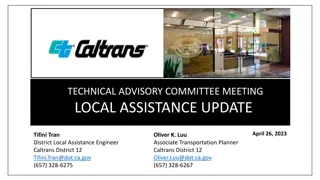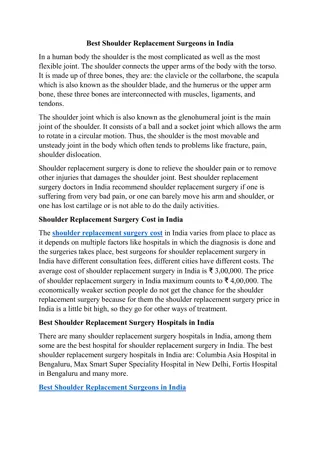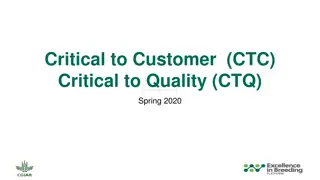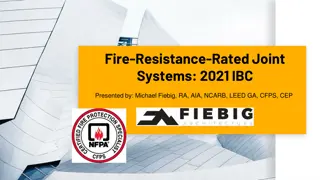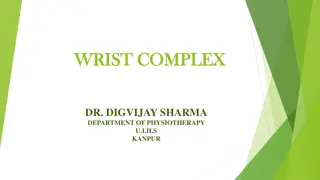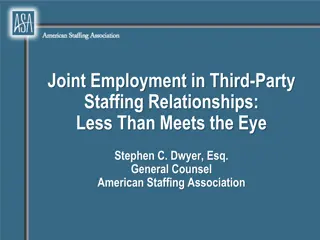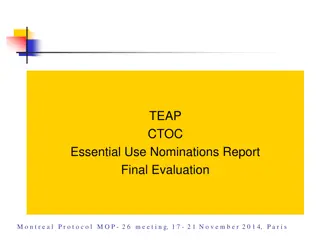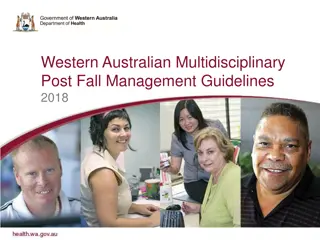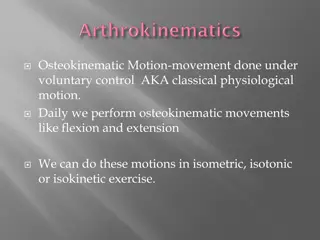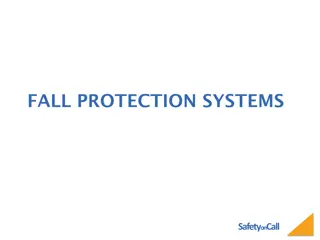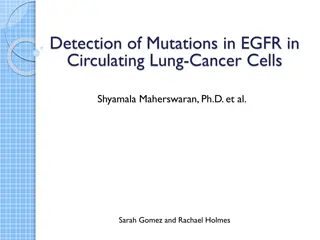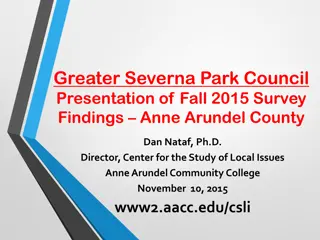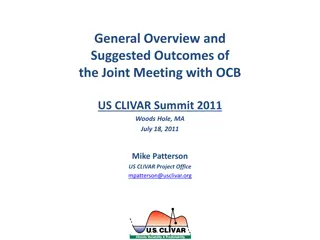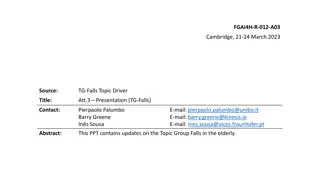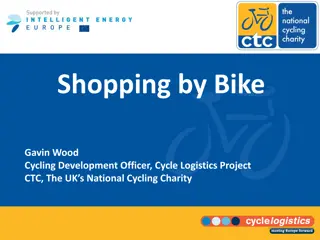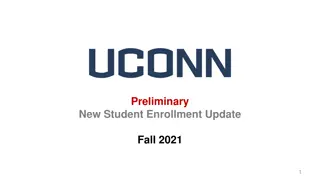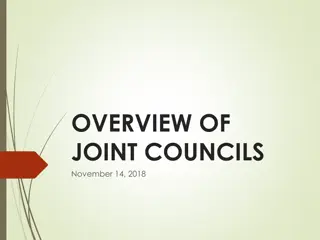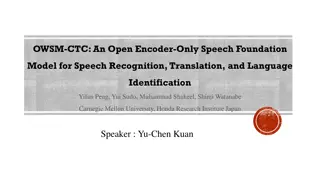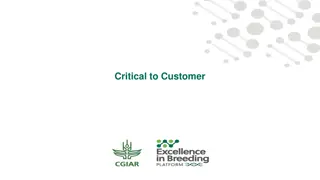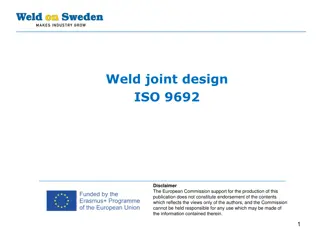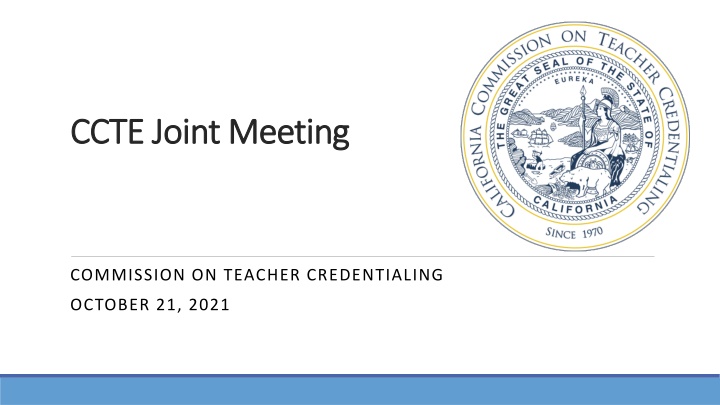
Commission on Teacher Credentialing: Education Specialist Transition Updates
Stay informed about the latest changes in the education specialist credentialing process, including new standards, transition plans, and authorization statements. Find out about significant updates in assessment requirements and authorization categories for special education teachers. Learn how programs are transitioning to meet the new standards set for the 2022-23 academic year.
Download Presentation

Please find below an Image/Link to download the presentation.
The content on the website is provided AS IS for your information and personal use only. It may not be sold, licensed, or shared on other websites without obtaining consent from the author. If you encounter any issues during the download, it is possible that the publisher has removed the file from their server.
You are allowed to download the files provided on this website for personal or commercial use, subject to the condition that they are used lawfully. All files are the property of their respective owners.
The content on the website is provided AS IS for your information and personal use only. It may not be sold, licensed, or shared on other websites without obtaining consent from the author.
E N D
Presentation Transcript
CCTE Joint Meeting CCTE Joint Meeting COMMISSION ON TEACHER CREDENTIALING OCTOBER 21, 2021
Agenda Education Specialist Credentials Transition and TPA Development Bilingual Standards and Transition Grant Opportunities COVID Flexibilities Basic Skills Options Subject Matter Requirement Options Q and A 2
Education Specialist Transition February 2018 Summer/Fall 2022 Commission approves the recommendation that all new special education teachers take and pass a Teaching Performance Assessment. August 2018 Dec. 2015 & June 2016 - new Multiple/Single Subject program standards and TPEs adopted Implementation date for preliminary programs to transition to the new Ed Specialist standards and TPEs Commission adopts new credential titles, program standards, and remaining TPEs February 2018 June 2018 April 2019 Commission adopts new Ed Specialist credential structure with 5 preliminary credentials Commission adopts DHH, VI, ECSE TPEs and subject matter competency requirements for Ed Specialists Commission adopts new authorization statements for the 5 preliminary credentials 2
Education Specialist Transition Plans for Implementation due October 31, 2021 All programs will transition to the new standards and TPE at the start of the 2022-23 academic year. Office Hours are offered the 2nd and 4th Mondays of the month at 10am (none in December) 3
Education Specialist Transition Significant changes include: Education Specialist candidates must take and pass a Commission-approved Education Specialist Teaching Performance Assessment. Both the MMSN and ESN credential have authorization statements that authorize the holder to provide services to students in similar disability categories which means there is new content to both programs. Clinical practice now has a required number of hours 600 including 200 hours in general and special education settings. 4
Future Authorization Statements (summer/fall 2022) New authorization statements focus on student needs in addition to the disability categories. Federal Disability Category DHH (Current & Future) VI MMD (Current) MMSN (Future) MSD (Current) ESN (Future) ECSE (Current) ECSE (Future) (Current & Future) Autism Deaf-blindness Deafness Developmental Delay Emotional Disturbance Hearing Impairment Intellectual Disability Multiple Disabilities Orthopedic Impairment Other Health Impairment Specific Learning Disability Traumatic Brain Injury Visual impairment, including blindness MMD = Mild/Moderate Disabilities MMSN = Mild to Moderate Support Needs MSD = Moderate/Severe Disabilities ESN = Extensive Support Needs ECSE = Early Childhood Special Education DHH = Deaf and Hard of Hearing VI = Visual Impairments 5
Bilingual Standards and Transition Proposed Revised Standards Organized by Program Design Preparing Candidates toward Mastery of the Bilingual Teaching Performance Expectations (BTPEs) BTPE domains aligned to and build upon the six domains of the universal TPEs and CSTPs Field Experience Monitoring, Supporting, and Assessing Candidate Progress towards Meeting Program Requirements Assessment of Candidate Competence 11
Bilingual Standards and Transition After Commission adoption of revised standards Technical Assistance provided to the field on revised program standards and BTPEs. Institutions submit a Transition Plan identifying program modifications. Within 1-2 years of Commission adoption, all approved programs are aligned to the revised program standards and BTPEs. 12
Grant Opportunities AB 130 Education Omnibus Trailer Budget Bill Teacher Residency Grant Program (Section 45) $350 million to create or expand Teacher Residency Programs (increase of $275 million) $25,000 per Teacher Resident (increase of $5,000) $0.80 match for every $1.00 of grant funds Classified School Employee Teacher Credentialing Program (Section 129) $125 million to recruit and support Classified staff who already hold an associate or higher degree to earn a teaching credential $24,000 per Classified Program participant over five years $4,800 per Classified Program participant per year
Grant Opportunities, continued Computer Science Authorization Incentive Grant Program (Section 143) $15 million over five years for LEAs to increase the number of current teachers to teach Computer Science $2,500 per participating teacher Dyslexia Grants to Preparation Programs (AB 128) $2 million in one-time General Fund to update program curriculum and course offerings to align with the common trunk Teacher Performance Expectations and the updated Education Specialist Teacher Performance Expectations and include pedagogy on dyslexia. Golden State Teacher Grant (GSTG) Program (Higher Ed TBL 132, AB 128) Administered by the California Student Aid Commission (CSAC) $500 million to the GSTG for three years $20,000 for each participating teacher in designated shortage fields includes special education, bilingual education, science, computer science, technology, engineering, mathematics, and CTE in STEM fields, multiple subject instruction, and transitional kindergarten, and any other fields identified by the commission. Commitment to work in Priority Schools, defined as having at least 55% unduplicated pupils
Grant Opportunities Timelines Teacher Residency Grant Program Teacher Residency Capacity Grants Request for Application (RFA) release: before November 1, 2021 Teacher Residency Expansion Grant RFA release: late 2021 Teacher Residency Grant RFA release: early 2022 Classified School Employee Teacher Credentialing Program RFA release: late 2021 Computer Science Incentive Grant Program RFA release: to be determined Dyslexia Grants to Preparation Programs RFA release: early 2022
COVID Flexibilities: AB 130 Basic Skills, Subject Matter, RICA - flexibility extended through Dec. 31, 2021 (AB 130) must be due to testing center closures Commission to determine whether to extend to June 30, 2022 (closures/capacity) at December 2021 meeting. TPA/APA extended through 2021-22 academic year (AB 128) - 4 Conditions MUST be met 12
COVID Flexibilities Commission action Waived Precondition requiring subject matter prior to daily whole class instruction (2021-22 school year) (student teachers) Clinical practice flexibilities for Prelim MS/SS (2021-22 school year) 12
Basic Skills Requirement Options AB 130 provided 2 new options for meeting BSR Became effective July 9, 2021 College-level coursework in Reading, Writing, Mathematics Combination of coursework and previously available options (CBEST, SAT, ACT, etc.)
Basic Skills Requirement Options Coursework must be Credit-bearing and taken for credit 3 semester or 4 quarter units earned Degree applicable (AA or higher) Grade of B or better From a regionally accredited institution
Subject Matter Requirements Options AB 130 provided 3 new options for meeting subject matter Became effective July 9, 2021 CTC will be presenting regulatory packet to Commission December 2021 PSA 21-10 and PSA 21-11 (what s different?) options now available for all Commission approved preparation programs. CTC Online is ready to accept recommendations. Webinar held October 18 is available on CTC website.
Subject Matter Options 1) CSET Examination 2) Completion of a Commission-Approved Subject Matter Program 3) Specified Degrees 4) Coursework Aligned to the SMRs 5) Combination of Coursework aligned to SMRs and CSET subtests
Questions and Answers Subscribe to PSD News to stay up to date with all Commission work Visit Commission Staff in Program Office Hours and Performance Assessment Office Hours Contact the Professional Services Division Visit the ECE Webpage 13

